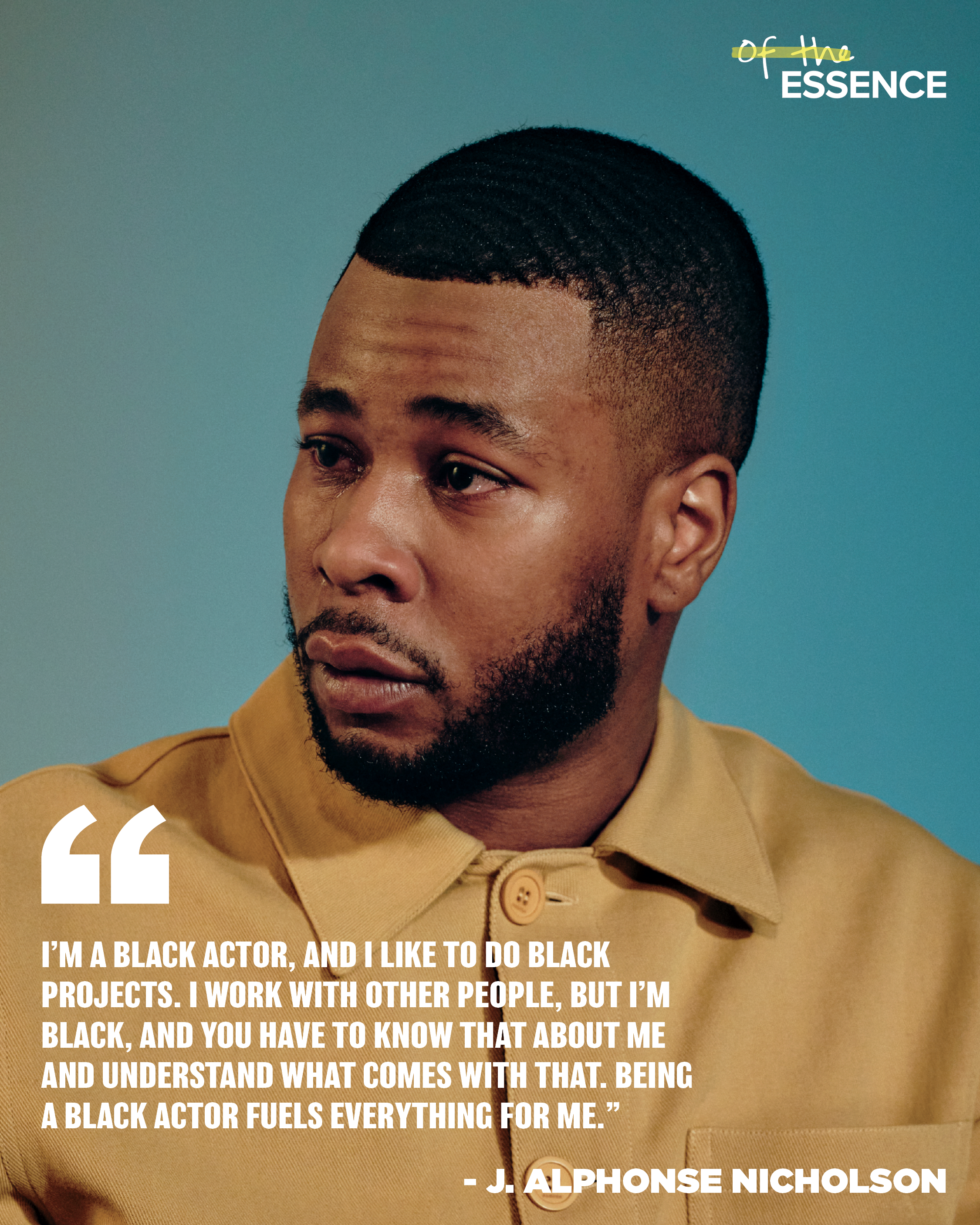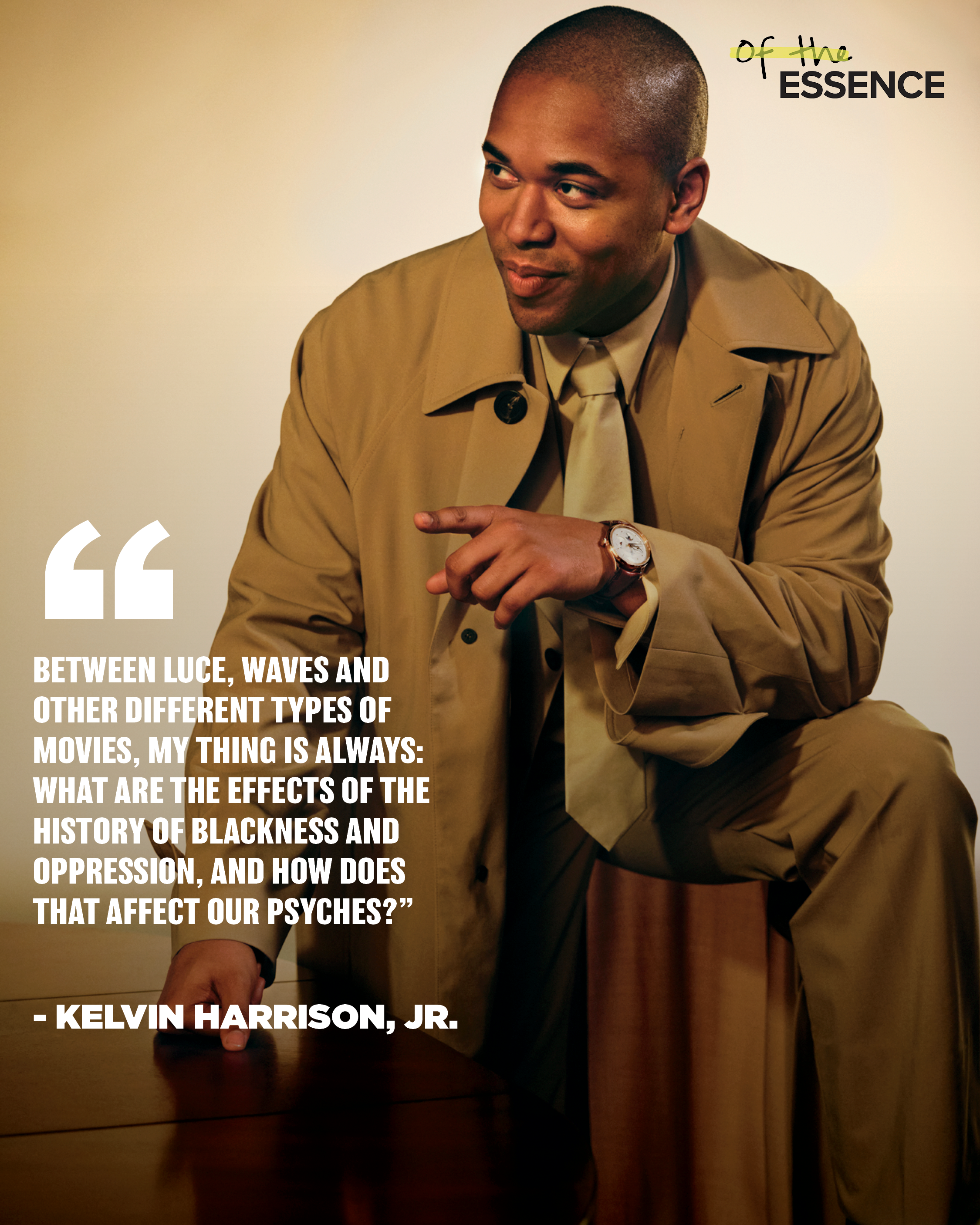
Controlling the narrative has always been the goal for Black creators in Hollywood. And when it comes to roles that expand our understanding of the Black male experience, these actors are taking them on. Whether their project is being streamed or shown on the big screen, their audiences are bearing witness to the talent and dominance they bring as entertainers.
Keith Powers has a face that was made to be seen—but as the young star works to build his résumé, people often make the mistake of thinking he’s just a pretty face, not a serious actor. “I get told a lot, ‘Oh, you’re just a look,’” the 30-year-old reveals.
It’s “a champagne problem,” he admits, but nevertheless a real one. And it’s the experience that made being offered the male lead in the upcoming Netflix adaptation of Tia Williams’s bestseller The Perfect Find, alongside Gabrielle Union, such a momentous achievement for Powers.

“It was really touching, and it put a lot of pressure on me, personally—because these people believe in me, and I can’t let them down,” he says of director Numa Perrier and producers Codie and Tommy Oliver. “That process is one I won’t forget— because as an actor, those offers are what you work toward.”
It’s hard to imagine the Sacramento native, who gained popularity for his portrayal of Ronnie DeVoe in The New Edition Story, disappointing his bosses or audiences. The success of the three-part TV miniseries was as much a win for fans of the ’80s boy band as it was for Powers.
“That’s when I really started to have Black people recognize me for real, for real,” he says. “I was praying for that. My goal was never to just be famous—but when New Edition came out and Black people started recognizing me, nothing could compare. That’s when I told myself, I don’t care about anything else. I’ve got to do stuff for my people.”
J. Alphonse Nicholson has been widely praised for expanding representations of Black masculinity with his portrayal of queer rapper Lil Murda on the Starz series P-Valley. But there’s something to be said, too, for the way the character broadened the lens through which Black southern men are shown.
“I was able to connect to that role in a way that I felt was useful because I grew up in the Bible Belt of North Carolina, where so many things aren’t accepted and you have to hide yourself and who you are,” says the Greensboro native. “There’s nothing like being able to represent where you’re from and that part of the culture.”
Nicholson, 32, built on that groundwork with the Christian film Southern Gospel, released in March. In it he plays a man whose past trauma threatens his relationship with God. “It was one of those projects that I knew was going to allow me to show my range,” he says of the independent movie.

And range is exactly what fans of Nicholson will see this year, as he shows up in Hulu’s White Men Can’t Jump reboot, Netflix’s sci-fi mystery They Cloned Tyrone, and the FX limited series The Sterling Affairs.
Still, as his audience and the types of roles he plays both diversify, Nicholson is firm about his identity and the propulsion behind his art. “I’m a Black actor, and I like to do Black projects,” he says. “I work with other people, but I’m Black, and you have to know that about me and understand what comes with that. Being a Black actor fuels everything for me.”
Larenz Tate has nothing left to prove in regard to his prowess on-screen. He’s portrayed everything from a troubled teen, in his debut feature film Menace II Society, to the spellbound Darius Lovehall in Love Jones—and he embodied ’50s doo-wop singer Frankie Lymon in Why Do Fools Fall in Love. The veteran actor has been strategic in that regard.
“I’m always looking for challenges,” he says of the varied characters he’s played. “I’m always looking for something that won’t put me in a box.” Currently staring as a corrupt politician in Starz’s Power Book II: Ghost, Tate, 47, is planning to shift his focus, so that he can be not only a storyteller but also a decision maker when it comes to projects that center Black life. “I want to take the next step of doing things from a business standpoint,” he says. “The fact is, a lot of us are in front of the camera. There’s so much power behind the scenes.”
It’s producing, specifically, that Tate aims to lean into more. He and his brothers, fellow actors Laron and Lahmard, have already established production company TateMen Entertainment, which was behind the 2017 Netflix crime drama Deuces. “There are so many stories we have to tell,” he says, “but unfortunately there are not enough of us in the rooms or at the table who can make those decisions to green-light the stories that matter most to us. I tell people all the time when I sit down with execs, ‘We, as Black folks, we’re not looking for any handouts. We have earned our right to be here.’”
Sinqua Walls makes a surprising observation about navigating an industry known for selling fantasies: “Authenticity sells.”

That belief certainly holds true for him. Sixteen years after his first TV gig, on Lincoln Heights, Walls, now 38, had a breakout role in seasons 1 and 2 of Power. This led to his being cast as Don Cornelius in the TV series American Soul, before he switched to movies. Last year’s horror film Nanny, in which Walls played the male lead, won the Grand Jury Prize at the 2022 Sundance Film Festival.
This summer he’ll appear in the comedy horror The -Blackening and as the co-lead in the White Men Can’t Jump reboot, set for release May 19. “God really has a purpose for me,” he says. “I shot four films back-to-back that have all reached some level of success. I’m immensely grateful.”
A former basketball player, Walls, who grew up in Los Angeles, spent his college years moving from the court to the classroom to auditions. Over time, his zeal for acting won out over athletics and academics. “I think everyone should try to find that thing that drives them and that they’re passionate about, because when you do, you wake up in the morning with joy,” he says. “That was something that I thought about—and realized, I love acting. I grew up loving it. I always watched. I always analyzed. It was something that was always reverberating in me.”
Kelvin Harrison, Jr., will soon be known as the man who played both B.B. King and Basquiat. As an actor who has always examined the complexities of Black men on-screen—both historical figures and fictional characters—Harrison is clear about the intention behind his depictions.
“Between Luce, Waves and other different types of movies, my thing is always: What are the effects of the history of Blackness and oppression, and how does that affect our psyches?” he explains. “And, therefore, how do we move forward?”

His new film, Chevalier, is another example of that exploration, he says. In the biographical film, which was released on April 21, the 28-year-old New Orleans native stars as Joseph Bologne, Chevalier de Saint-Georges—a violinist and composer who was poised to be the first Black conductor of the Paris Opera in 1776.
Harrison, who’s also a musician, trained for six months to relearn how to play the violin for the movie. “That was my first instrument,” he says. “Before Katrina, I was a violin player, and I was really good. Then the storm happened and the program I was a part of went away, and I never played again—until now.”
For his next role, Harrison has taken on the part of Martin Luther King, Jr., in the upcoming Disney+ and National Geographic series Genius: MLK/X. Of his approach to playing icons, he says, “I don’t necessarily follow the doctrine of playing people to the T. My job is to give the essence and the spirit of what they represented.”
Shamier Anderson is building his acting résumé with the greats. After a breakout role in Halle Berry’s directorial debut Bruised and an appearance alongside Keanu Reeves in John Wick: Chapter 4, the Toronto native will star opposite Jamie Foxx and Robert De Niro in Tin Soldier later this year.
“I’m working with some titans,” Anderson, 32, acknowledges. “But when that ‘action’ hits, it’s all about the work.”

There’s been plenty of that to go around for the actor, who also played a lead in the feature film Bruiser, which premiered on Hulu in February. “It’s really a love story, where you have two Black fathers wanting to love their son,” he says. “It’s very rare that we get to see Black men as fathers on-screen wanting to be present.”
His comment speaks to the limited scope of characters Black actors are afforded the opportunity to play. Even so, Anderson remains selective. “When I get a script, I’m looking for the best story, the best characters, the best work,” he says. “Typecasting isn’t something I’m worried about.”
With a return to the second season of Apple TV’s Invasion, also coming in 2023, Anderson is more focused on building a lasting legacy. “When you come to me with an opportunity, I say, ‘Thank you—I accept, and I won’t disappoint,’ ” he states. The bottom line? “I am a screen king, and I want to have a screen empire.”
Production Credits:
Talent: Keith Powers, Kelvin Harrison Jr., Larenz Tate, J. Alphonse Nicholson, Shamier Anderson, and Sinqua Walls
Photographed by Elliott Jerome Brown Jr.
Styling by Marquise Miller and Aaron Christmon
Tailors: Sean Parson and Ta’lor Floyd
Grooming by Cassandra Normil using Graftobian HD Makeup and Caudalie at The Visionaries Agency
Groomer Assistant: Lindsey Torres
Barber: Renjie Pajarillo
Set Design by Jesse Hoffman
Set Designer Assistants: Jesse Clark and Tristan Kallas
Photo Assistant: Alberto Vargas
Digitech: David Angel Rodriguez
Stylist Assistants: Raf Talaat, David Gomez, Damaris Flores, and Julian Ghost
Production Manager: Daisy Robinson
Production Coordinator: Alaura Wong and Benjamin Rigby
Production Assistants: Alondré Peoples and Jordan Mack
Photography Direction: Michael Quinn
Production by The Morrison Group

